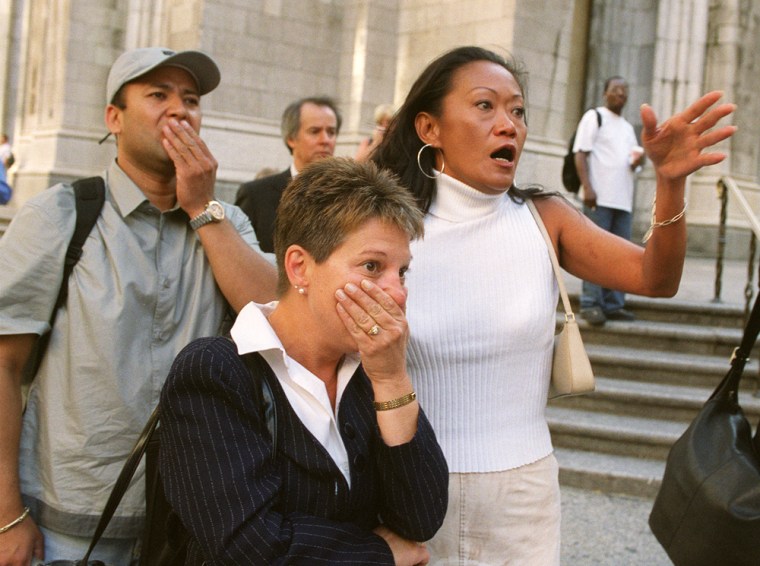Americans today are as fearful of becoming victims of terrorism as they are of losing their jobs or having their homes burglarized, according to a new poll taken for The Associated Press.
Almost all of the people questioned say they remember what they were doing when they learned about the Sept. 11 attacks on the World Trade Center and the Pentagon — and seven in 10 say those memories are among their most vivid.
Such a highly charged atmosphere could play to the advantage of President Bush, who counts his handling of terrorism as a leading strength.
Those who were worried about another terrorist attack, including women with those concerns, were more likely to support the president. Those who were less worried were more likely to support Democrat John Kerry.
Almost four in 10 said they sometimes worry about the possibility of another terrorist attack — about the same number who worry about getting burglarized or losing a job.
In a measure of the trauma of Sept. 11, the AP-Ipsos poll found that 98 percent remember exactly what they were doing three years ago when hijackers flew jetliners into the World Trade Center and the Pentagon, killing almost 3,000 people.
Personal accounts of 9/11
Those memories can resurface with the most routine cues — a plane flying overhead, a siren from a passing ambulance or news about the ongoing war in Iraq.
“I hardly go to Manhattan any more,” said Andre Garcia, a 20-year-old student from the Bronx borough of New York City. “I don’t call it a fear, I call it ’me being safe.’ I don’t want to be over there when it happens.”
Dawn Davis, a 40-year-old working mother in rural Arkansas, remembers hearing about the attacks that day, turning on the television and staying glued to the set for the rest of the day, watching the Twin Towers collapse, people falling to their deaths, pedestrians fleeing in the streets.
“I just stayed on the couch, crying all day,” she said. Now when she hears a plane go overhead, she sometimes thinks, “It could be a plane ready to bomb where we live.”
For most, the dominant feeling about that day was deep anger that anyone would commit such an act against this country. Republicans and Democrats were equally likely to say they felt that way.
Juan Jose Torres, a 32-year-old eighth-grade teacher from Laredo, Texas, says that after the attacks his students overwhelmed him with questions he couldn’t answer.
“I had to admit I didn’t know what was going on,” Torres said. “I just freaked out.
“The memory pops up from time to time,” he said. “If I hear a siren, the first thing I think of is 9/11. If somebody screams, I think about 9/11.”
Women were more likely than men to worry about being victimized by terrorists, but they were also more likely to worry about other things such as a burglary or having a car accident.
Heather Rojo, a 26-year-old wife and mother from Pierre, S.D., says she feels insulated from terrorism now, after feeling threatened when she and her husband lived in Orange County, Calif.
“The times the worry pops up with me is when we fly a couple of times a year,” she said. “I actually have chosen to drive instead of flying.”
Asking about blame
When people are asked who they blame for the terrorist attacks, they are most likely to name the terrorists themselves, but seven in 10 said they think the CIA deserves some blame. Almost that many fault the FBI and airline security.
Only one in five of those who worry about a terrorist attack say it affects how they live.
For Tony Volpitta, a 34-year-old father of three daughters from Curtis, Ohio, it’s more of a nagging fear about the future.
“I just hope I can watch them graduate,” Volpitta said of his daughters. “I hope we’re not all on the run like in 'Terminator.'"
The AP-Ipsos poll of 1,000 adults was conducted Aug. 27-29 and has a margin of sampling error of plus or minus 3 percentage points.
